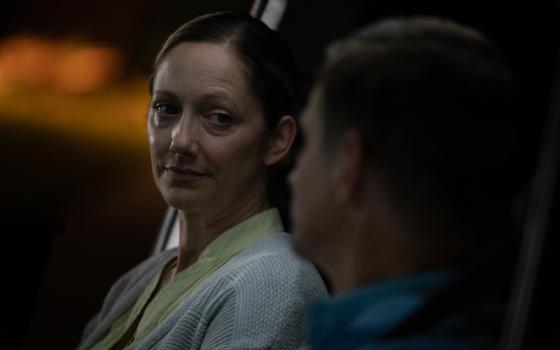
Luis Fernando Figari, founder of Sodalitium Christianae Vitae, is pictured in a 2006 photo. The Peruvian-based Catholic movement has acknowledged that Figari committed sexual, physical and psychological abuse of teens and young adults in the group, including minors. (CNS/Daniele Colarieti, EPA)
Vatican officials have denied protecting the founder of Sodalitium Christianae Vitae, a Peru-based religious movement, who is accused of sexual, physical and psychological abuse of minor and young adult members of the group.
In a communique dated May 25 and released by the Peruvian bishops' conference at a news conference June 1, the Vatican Congregation for Institutes of Consecrated Life and Societies of Apostolic Life said it was responding to claims that it had "hidden" Luis Fernando Figari in Rome and was "protecting him."
Meanwhile, the archbishop of Guayaquil, Ecuador, announced that he is awaiting a final ruling from the Vatican Congregation for the Doctrine of the Faith in the case of a priest who is accused of physical and sexual abuse of adolescents while he was affiliated with Sodalitium in that city.
The communique from the Congregation for Institutes of Consecrated Life and Societies of Apostolic Life responded to criticism of guidelines issued to Sodalitium more than a year ago in the case of Figari, who founded the movement in 1971.
In January 2017, the congregation informed Sodalitium's superior general, Alessandro Moroni, that an investigation begun in 2015 determined that Figari had been authoritarian and had committed "acts against the Sixth Commandment," including at least one case of sexual abuse involving a minor.
At that time, the congregation said that Figari should not be expelled from Sodalitium but should be ordered not to return to Peru except under serious circumstances and with written permission from the movement's superior general. In addition, he should live in a place other than a Sodalitium residence, have no contact with members of the movement except for a person designated to be a liaison with him, and not make public statements or participate in demonstrations.
Figari, who is living in Rome, appealed that ruling. His initial appeal was rejected Jan. 31. A decision on a second appeal is pending.
In the May 25 communique, the congregation said the measures were meant to offer reparation for "the harm done by (Figari) and the resulting scandal," and to "re-establish justice with the victims" and "keep him from causing more harm to anyone."
In Peru, the statement said, Figari has "much support" and "greater possibility of causing harm, especially to persons," and of "concealing or destroying evidence against him, and therefore of avoiding determination of the truth of the events and of obstructing the course of justice."
Oscar Osterling, one of five former Sodalitium members who have filed a legal complaint about the abuse in Peru, called the communique "superficial" and said it continued to focus on Figari, without considering three other leaders of the movement who are also accused of abuse. Another accused leader has died.
The Peruvian prosecutor has recommended preventive detention for former leaders of the movement. A judge has yet to rule on the recommendation.
Meanwhile, in neighboring Ecuador, the Archdiocese of Guayaquil is waiting to hear whether the Congregation for the Doctrine of the Faith will remove Fr. Luis Fernando Intriago, who currently is suspended, from the priesthood.
Advertisement
Intriago is accused of having abused at least 10 adolescents in his parish in Guayaquil beginning about a dozen years ago. He was suspended in 2013.
Intriago founded the Christian Life Movement, an offshoot of Sodalitium, in Ecuador. Young men who are now in their 20s reported that the priest told them to strip naked or to their underwear and that he tied them with ropes and blindfolded them, dragged them across the floor, hung them from bars or administered electric shocks in a practice he called "the dynamic of sin."
In a letter dated May 11, 2018, Guayaquil Archbishop Luis Cabrera Herrera said the sex crimes could not be prosecuted in Ecuador because the statute of limitations had expired, but that the priest could still face prosecution for torture.
He said an ecclesial court had found the priest guilty of "inappropriate behavior" and failure to "observe precautionary measures," adding that the archdiocese was awaiting the doctrinal congregation decision to laicize the priest. The statement said the priest could appeal.
The "dynamic of sin" is "not approved by the Catholic Church in any way," the archbishop wrote, adding that the practice constituted an attack on people's "physical, moral, psychological and spiritual integrity."
On Jan. 10, less than a week before Pope Francis visited Peru, the Vatican congregation named Colombian Bishop Noel Antonio Londono Buitrgo to serve as trustee of Sodalitium. Cardinal Joseph Tobin of Newark, New Jersey, was named papal delegate for the case.



